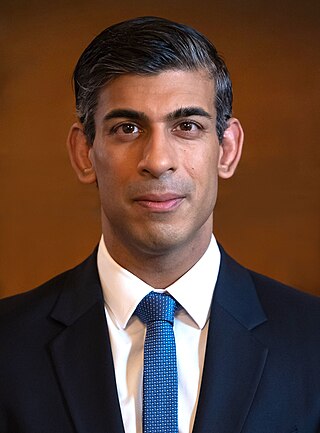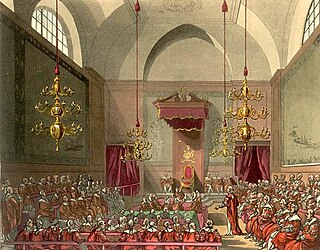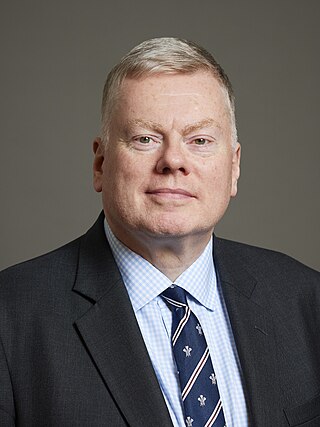
The House of Lords is the upper house of the Parliament of the United Kingdom. Like the lower house, the House of Commons, it meets in the Palace of Westminster in London, England. One of the oldest institutions in the world, its origins lie in the early 11th century and the emergence of bicameralism in the 13th century.

The House of Commons is the lower house of the Parliament of the United Kingdom. Like the upper house, the House of Lords, it meets in the Palace of Westminster in London, England. The House of Commons is an elected body consisting of 650 members known as members of Parliament (MPs), who are elected to represent constituencies by the first-past-the-post system and hold their seats until Parliament is dissolved.

The Parliament of the United Kingdom of Great Britain and Northern Ireland is the supreme legislative body of the United Kingdom, and may also legislate for the Crown Dependencies and the British Overseas Territories. It meets at the Palace of Westminster in London. Parliament possesses legislative supremacy and thereby holds ultimate power over all other political bodies in the United Kingdom and the Overseas Territories. While Parliament is bicameral, it has three parts: the sovereign, the House of Lords, and the House of Commons. The three parts acting together to legislate may be described as the King-in-Parliament. The Crown normally acts on the advice of the prime minister, and the powers of the House of Lords are limited to only delaying legislation.

The United Kingdom is a constitutional monarchy where executive power is delegated by legislation and social conventions to a unitary parliamentary democracy. From this a hereditary monarch, currently King Charles III, serves as head of state while the Prime Minister of the United Kingdom, currently Sir Keir Starmer since 2024, serves as the elected head of government.

Peerages in the United Kingdom form a legal system comprising both hereditary and lifetime titles, composed of various ranks, and within the framework of the Constitution of the United Kingdom form a constituent part of the legislative process and the British honours system. The British monarch is considered the fount of honour and is notionally the only person who can grant peerages, though there are many conventions about how this power is used, especially at the request of the British government. The term peerage can be used both collectively to refer to the entire body of titled nobility, and individually to refer to a specific title. British peerage title holders are termed peers of the Realm.

The Parliament Acts 1911 and 1949 are two Acts of the Parliament of the United Kingdom, which form part of the constitution of the United Kingdom. Section 2(2) of the Parliament Act 1949 provides that the two Acts are to be construed as one.

Andrew Bonar Law was a British statesman and Conservative politician who was Prime Minister of the United Kingdom from October 1922 to May 1923.

The leader of the House of Lords is a member of the Cabinet of the United Kingdom who is responsible for arranging government business in the House of Lords. The post is also the leader of the governing party in the House of Lords who acts as the government party chairperson in the house. The role is always held in combination with a formal Cabinet position, usually one of the sinecure offices of Lord President of the Council, Lord Keeper of the Privy Seal or Chancellor of the Duchy of Lancaster. Unless the Leader is also a departmental minister, being Leader constitutes the bulk of their government responsibilities, but it has never been an independent salaried office. The Office of the Leader of the House of Lords is a ministerial department.
A crossbencher is a minor party or independent member of some legislatures, such as the British House of Lords and the Parliament of Australia. They take their name from the crossbenches, between and perpendicular to the government and opposition benches, where crossbenchers sit in the chamber.
The Salisbury Convention is a constitutional convention in the United Kingdom under which the House of Lords should not oppose the second or third reading of any government legislation promised in its election manifesto. The origins of the convention date back to the late 19th century, at which time the Conservatives held a majority in the House of Lords and, with the support of the third Marquess of Salisbury, developed the "Referendal Theory", which applied solely to Liberal legislation, under which the House of Lords could obstruct legislation until it had received majority approval at a general election. This was changed following the landslide Labour Party victory in the 1945 general election, which produced a Labour government seen as having a popular mandate for significant reform, while once again there was a Conservative majority in the House of Lords. The fifth Marquess of Salisbury announced that the Lords "would not seek to thwart the main lines of Labour's legislation provided it derived from the party's manifesto for the previous election". From this point, manifesto bills were only to be adjusted by the Lords; however, on non-manifesto bills, the Lords were able to act as they had before.
In the United Kingdom, life peers are appointed members of the peerage whose titles cannot be inherited, in contrast to hereditary peers. Life peers are appointed by the monarch on the advice of the prime minister. With the exception of the Dukedom of Edinburgh awarded for life to Prince Edward in 2023, all life peerages conferred since 2009 have been created under the Life Peerages Act 1958 with the rank of baron and entitle their holders to sit and vote in the House of Lords, presuming they meet qualifications such as age and citizenship. The legitimate children of a life peer appointed under the Life Peerages Act 1958 are entitled to style themselves with the prefix "The Honourable", although they cannot inherit the peerage itself. Prior to 2009, life peers of baronial rank could also be so created under the Appellate Jurisdiction Act 1876 for senior judges.

The Leader of His Majesty's Most Loyal Opposition, more commonly referred to as the Leader of the Opposition, is the person who leads the Official Opposition in the United Kingdom. The position is seen as the shadow head of government of the United Kingdom and thus the shadow prime minister of the United Kingdom.

The Official Opposition Shadow Cabinet, or His Majesty’s Most Loyal Opposition Shadow Cabinet, but usually simply the Shadow Cabinet, is the committee of senior members of the Official Opposition who scrutinise the work of the Cabinet of the United Kingdom. Each Shadow Cabinet member is typically given a position which corresponds to that of a government minister in Cabinet. Shadow Cabinet members, commonly known as shadow ministers, are usually appointed by the leader of the Opposition. The roles of shadow ministers are to develop alternative policies, hold the government to account for its actions and responses, and act as spokespeople for the opposition party in their own specific policy areas. By convention, shadow ministers are drawn either from serving members of the House of Commons or the House of Lords, with most chosen from the former. Since July 2024, the Conservative Party has been the Official Opposition, and its leadership therefore forms the current Shadow Cabinet.
The Liberal Democrats are a political party in the United Kingdom. While in opposition, the Leader of the Liberal Democrats appoints a frontbench team of Members of Parliament (MPs), Peers, Members of the Scottish Parliament (MSPs) and Members of the Senedd (MSs), to speak for the party on different issues. Their areas of responsibility broadly corresponded to those of Government ministers. The frontbench team is divided into departmental sub-units, the principal ones being the economy, foreign policy, and home affairs. Sometimes the frontbench team consists of more than just the principal positions.

The Lord Speaker of the House of Lords is the presiding officer, chairman and highest authority of the House of Lords in the Parliament of the United Kingdom. The office is analogous to the Speaker of the House of Commons: the Lord Speaker is elected by the members of the House of Lords and is expected to be politically impartial.

The reform of the House of Lords, the upper house of the Parliament of the United Kingdom, has been a topic of discussion in UK politics for more than a century. Multiple governments have attempted reform, beginning with the introduction of the Parliament Act 1911 by the incumbent Liberal Government, which stated:
...whereas it is intended to substitute for the House of Lords as it at present exists a Second Chamber constituted on a popular instead of hereditary basis, but such substitution cannot be immediately brought into operation

Roy Francis Kennedy, Baron Kennedy of Southwark, is a British Labour and Co-operative politician and life peer who served as Opposition Chief Whip in the House of Lords from 2021 until 2024, when the Labour Party entered Government.

The Fixed-term Parliaments Act 2011 (FTPA) was an Act of the Parliament of the United Kingdom which, for the first time, set in legislation a default fixed election date for general elections in the United Kingdom. It remained in force until 2022, when it was repealed. Since then, as before its passage, elections are required by law to be held at least once every five years, but can be called earlier if the prime minister advises the monarch to exercise the royal prerogative to do so. Prime ministers have often employed this mechanism to call an election before the end of their five-year term, sometimes fairly early in it. Critics have said this gives an unfair advantage to the incumbent prime minister, allowing them to call a general election at a time that suits them electorally. While it was in force, the FTPA removed this longstanding power of the prime minister.

His Majesty's Most Loyal Opposition, commonly known as the Official Opposition in the United Kingdom, is the main political opposition to His Majesty's Government. This is usually the political party with the second-largest number of seats in the House of Commons, as the largest party will usually form the government. Since July 2024, the Official Opposition has been the Conservative Party, led by former British prime minister Rishi Sunak.
The position of Prime Minister of the United Kingdom was not created as a result of a single action; it evolved slowly and organically over three hundred years due to numerous Acts of Parliament, political developments, and accidents of history.
































